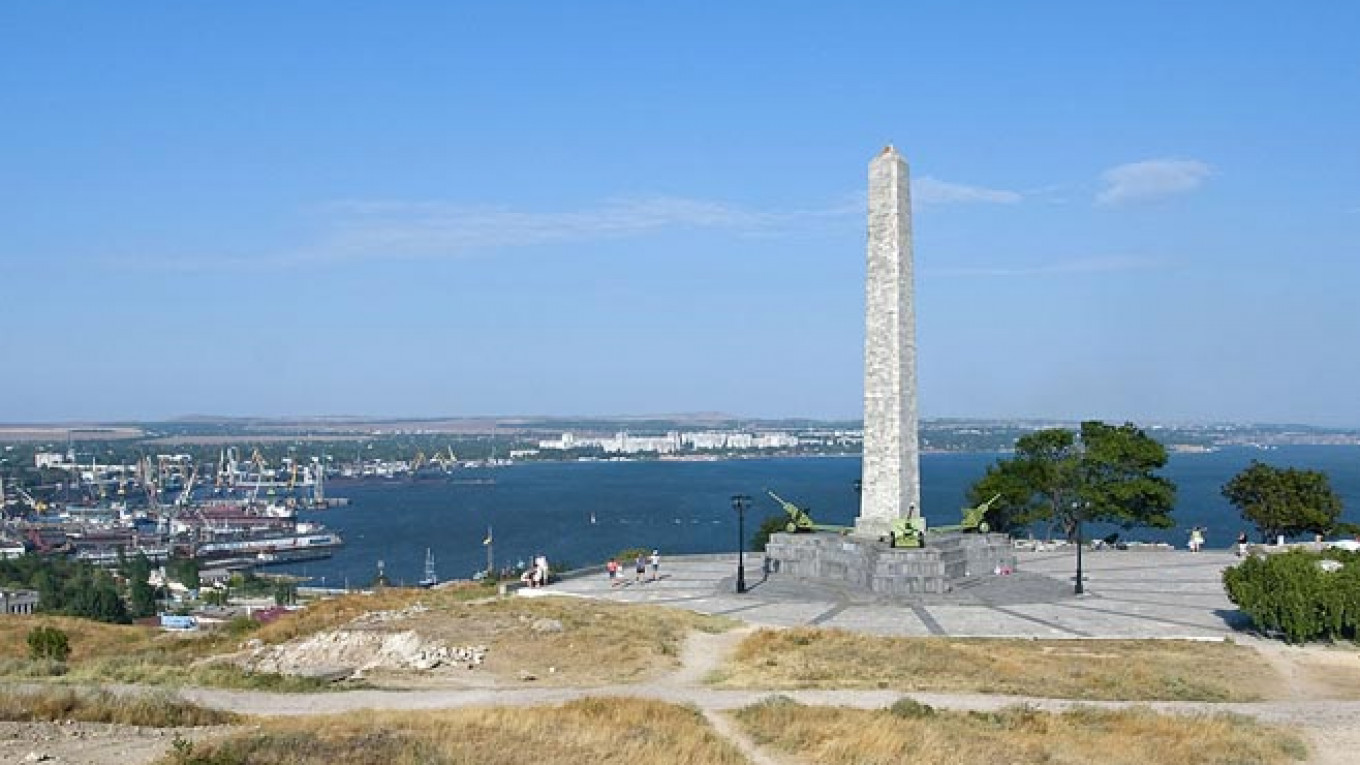Following Russia's lightning-fast incorporation of Crimea, authorities are throwing vast amounts of financial and human resources into efforts to create a model region and win more support from the already jubilant population.
On Monday, Prime Minister Dmitry Medvedev added weight to Russia's claim to own the peninsula by bringing half of the Cabinet to Crimea's administrative center of Simferopol to discuss the economic and social development in the region.
"No resident of Crimea or Sevastopol should feel any drawbacks from joining Russia, only gains," Medvedev said, according to an official transcript on the government's website.
Although now formally part of Russia, Crimea still depends on Ukraine for 85 percent of its electricity, 80 percent of its drinking water and a large part of its food supplies. Medvedev outlined several infrastructure projects that are meant to sever the region's reliance on Ukraine.
To solve the water problem a pipeline will have to be built across the 3.1-kilometer Kerch Strait from the neighboring Krasnodar region, Medvedev said. Reservoirs will be created on the Taman peninsula on the Russian side of the strait, while underground water will be drilled for.
The reliance on electricity from Ukraine could be cut by either building generation facilities on the spot or by connecting Crimea to the Russian grid, Medvedev said.
As for transport accessibility to Russia, plans are underway to modernize the road and rail network, including building a bridge to directly connect Crimea with mainland Russia through the Kerch Strait.
"A transport corridor across the Kerch Strait will definitely be built," Medvedev said.
The cost of these projects, however, is yet to be calculated. Preliminary estimates suggest billions of dollars will be needed.
Medvedev was silent on the issue during his visit.
Last week, Finance Minister Anton Siluanov said that 240 billion rubles ($6.8 billion) would be required to support Crimea and Sevastopol this year alone.
According to the Transportation Ministry, the bridge across the Kerch Strait, exploration works for which are slated to begin this year, will come to at least 50 billion rubles ($1.3 billion). The Economic Development Ministry earlier estimated that a total of about $5 billion will be required to modernize Crimea's transport and tourism infrastructure.
The largesse is reminiscent of Russia's spending splurge on the Olympic Games in Sochi. Opening a meeting with the governor of Krasnodar region Alexander Tkachyov on Saturday, Medvedev said all the government's attention is now being diverted from Sochi to Crimea.
Some economists were skeptical that everything in Medvedev's wish list had to be built from scratch.
"Judging by all the plans that have been announced for Crimea, the goal seems to be to spend as much as possible," said Sergei Zhavoronkov, senior researcher at economic think tank the Gaidar Institute.
It is unnecessary to build electricity cables under the Kerch Strait or set up power generating facilities on Crimean territory, he said. "If territorial claims between Russia and Ukraine are settled, it would be logical to consider buying Ukrainian electricity and water in exchange for some form of discount on gas prices," Zhavoronkov said.
Other energy industry analysts disagreed, saying that dependence on Ukraine for electricity supply would make Crimea strategically vulnerable.
"Last week, Ukraine cut its power supply [to Crimea] by 50 percent and it is evident that their authorities will use the peninsula's dependence on electricity in their own political interests," said Igor Yushkov, a leading analyst at the Moscow-based National Energy Security Fund.
Crimea's energy independence will eventually require a gas pipeline to be built across the Kerch Strait to fuel local power generation, Yushkov said.
Vladimir Sklyar, an analyst at Russian bank Renaissance Capital earlier estimated for energy news agency Pronedra.ru that investment from $300 million to $10 billion would have to be channeled to Crimea to ensure its energy independence.
Yushkov said that the money is likely to be found. "This is a political decision … The authorities want to make a model region [out of Crimea], which means it has to have a better quality of life than in the eastern Ukrainian regions and to have own power generation," he said.
Contact the author at [email protected]
A Message from The Moscow Times:
Dear readers,
We are facing unprecedented challenges. Russia's Prosecutor General's Office has designated The Moscow Times as an "undesirable" organization, criminalizing our work and putting our staff at risk of prosecution. This follows our earlier unjust labeling as a "foreign agent."
These actions are direct attempts to silence independent journalism in Russia. The authorities claim our work "discredits the decisions of the Russian leadership." We see things differently: we strive to provide accurate, unbiased reporting on Russia.
We, the journalists of The Moscow Times, refuse to be silenced. But to continue our work, we need your help.
Your support, no matter how small, makes a world of difference. If you can, please support us monthly starting from just $2. It's quick to set up, and every contribution makes a significant impact.
By supporting The Moscow Times, you're defending open, independent journalism in the face of repression. Thank you for standing with us.
Remind me later.






